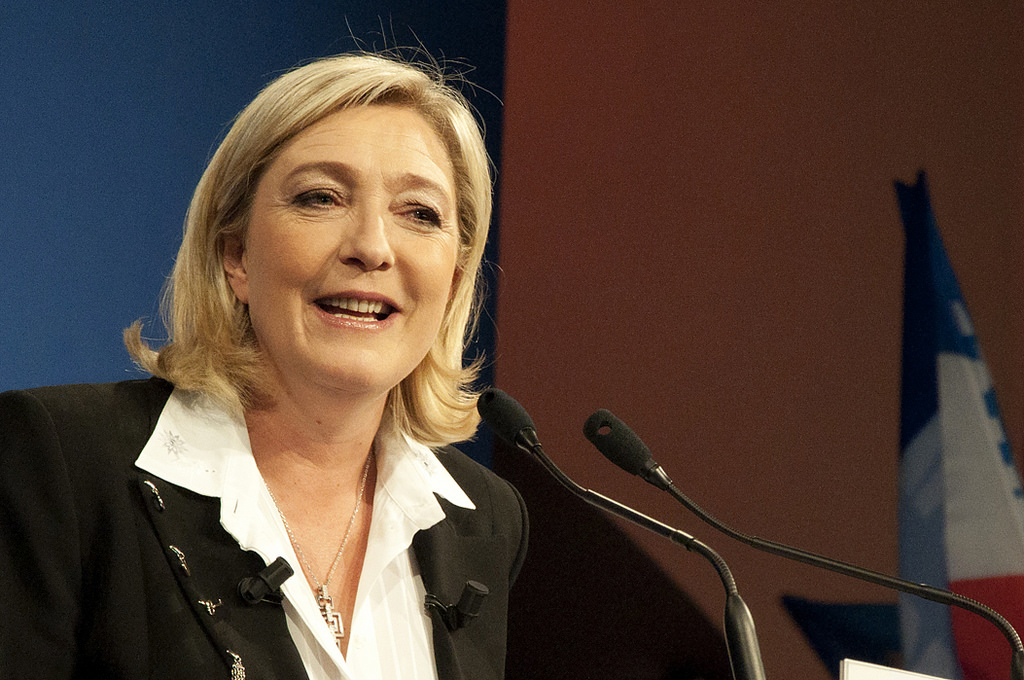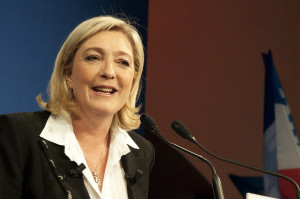A Trump Effect in France?
 Marine Le Pen, Leader of the extreme-right party Front National.
Source: http://bit.ly/2fG0wmt
Marine Le Pen, Leader of the extreme-right party Front National.
Source: http://bit.ly/2fG0wmt

Source: http://bit.ly/2fG0wmt
In North America and in France, it seems that we have come to a dramatic shift in politics. Indeed, President-elect Trump has shown that polls and surveys could be deceiving in the States, and as the French elections approach (today, Nov. 19th, 2016, marks the first round of the republican primaries), many people fear a surge of support for the Front National party led by Marine Le Pen. Leaders such as Angela Merkel and Justin Trudeau are now perceived by many as the last defence against a right-wing constellation combining Putin, Trump, May, Duterte and perhaps Le Pen. Some are convinced that they are reenacting the beginnings of the advent of Hitler. Most of the media, especially the New York Times, point their finger at the “bad” portion of the American people, apparently mostly composed of old, uneducated, rural white males who voted against gay marriage, environmental protection, open markets, recognition of minorities, and immigration: in short, tenants of the old order who voted against a specific view of progress.
Designating this phenomenon as a retrograde sweep is in my opinion not only simplistic, but also subduing any chance at understanding what is happening in the Western world, and in France specifically. Waving the never-ending spectre of Nazi Germany is out of context and counter-productive. American voters could only find a voice inside the voting booth, mostly because of the disdain aimed at anything remotely republican or nationalist. The French philosopher Alain Finkielkraut, whom I have mentioned in a previous article, designates this voting bloc in more explanatory terms: they are “the losers of globalization” and they too are entitled to defend their interests.
Will there be a “Trump effect” in the 2017 French elections? While Le Pen will certainly gain some popularity, for now a more moderate candidate has been the one benefiting from a decisive push : François Fillon. We shall see whether he wins the primaries or not against Alain Juppé. Nicolas Sarkozy, for his part “remains stable” according to the latest surveys.

Source: http://bit.ly/2frYcMS
As for the general elections of 2017, the odds remain uncertain. Le Monde relies on a Cevipof (Center for Political Research of the Sciences Po School) survey indicating that, would there be a sudden vote en masse for an anti-establishment candidate, Le Pen (extreme-right) and Melenchon (extreme-left) have an equal amount of voters. Atlantico, on the other hand, uses a Harris Interactive survey asserting that 62% of their French sample expect a surprise similar to Trump’s election in the 2017 French elections, while 64% would consider such a surprise “a good thing.”
If the French left designates a candidate as off-putting as Clinton, the chances of a “Trump effect” in France are indeed bound to increase. However, let us remember that contrary to the two political parties (Democrats vs. Republicans) in the US, Marine Le Pen belongs to a party distinct from the others: this is not going to be an “all-or-nothing” choice.
